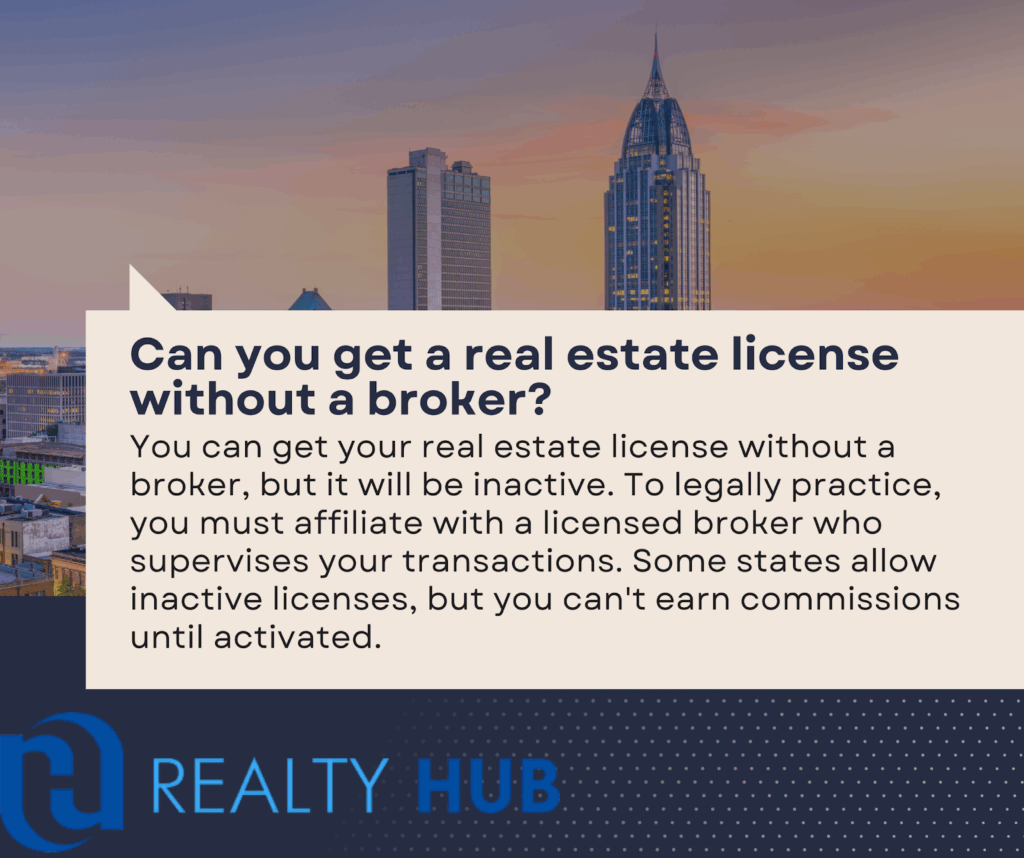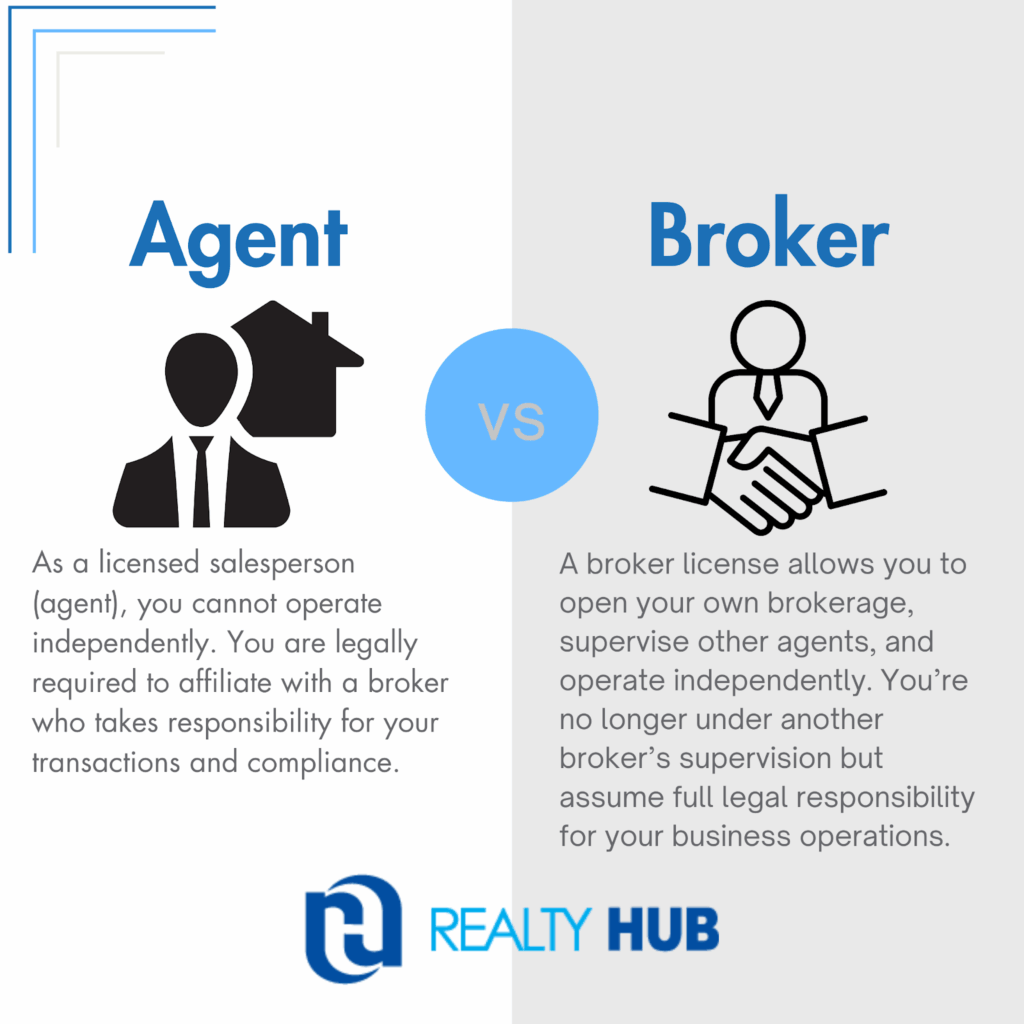You can get your real estate license without a broker, but it will be inactive. To legally practice, you must affiliate with a licensed broker who supervises your transactions. Some states allow inactive licenses, but you can’t earn commissions until activated.

This requirement exists because brokers serve a legal role: they oversee compliance, handle risk management, and ensure that agents follow both state law and professional standards. Without this supervision, states won’t allow real estate activity, even if you’re only planning to handle your own deals.
At Realty Hub, we offer a solution that gives agents maximum autonomy while still meeting these legal requirements. Our flat-fee brokerage model allows you to activate your license, keep 100% of your commissions, and avoid franchise fees, desk fees, and mandatory office meetings.
In this guide, we’ll break down exactly how licensing works, what your state requires, and how to structure your real estate business without sacrificing control, or your income.
Broker Required to Practice
Inactive vs. Active License Explained
When you earn your real estate license, what you receive is only part of the equation. Most states issue your license as inactive if you don’t have a broker ready to sponsor you. An inactive license means you hold the credential but cannot engage in any real estate transactions. No listings, no client representation, no commissions, your license sits dormant until activated.
An active license, on the other hand, means you’ve secured a sponsoring broker. Only then are you legally permitted to practice real estate, represent buyers or sellers, and collect commissions.
Broker’s Legal Supervision Role
Brokers serve as the legal framework that supports your practice. They take responsibility for compliance with state laws, oversee contracts, monitor financial transactions, and provide risk management oversight. In the eyes of regulators, an agent operates under the umbrella of their broker’s license, acting as an extension of that broker’s business.
Without a broker, the state has no oversight mechanism to ensure you’re complying with the myriad of laws that govern real estate transactions. This is why having an active broker affiliation is non-negotiable for practicing agents.
Why States Require Broker Oversight
Real estate involves significant financial transactions, consumer protection issues, and complex regulations. States rely on brokers to enforce standards and prevent misconduct. Brokers act as the supervisory layer, ensuring new agents don’t inadvertently violate laws or ethical rules. Without this oversight, even simple transactions can expose clients and the public to financial harm.
At Realty Hub, we believe oversight should empower agents, not control them. Our role is to handle compliance, legal questions, and transaction reviews, while you maintain full control over your business. You get the support when you need it, and autonomy when you don’t.
State-by-State Differences (Florida, Georgia, Alabama)
Florida: License Issued Inactive Without Broker
In Florida, once you pass the state exam and meet the basic licensing requirements, the state will issue your license as inactive if you don’t have a broker lined up. You cannot conduct real estate activities until you affiliate with a broker who activates your license.
Georgia: Inactive License Possible, No CE Required Until Activated
Georgia allows you to hold an inactive license indefinitely after passing the exam. You don’t need to complete continuing education while your license remains inactive, but you cannot legally conduct any real estate transactions or earn commissions.
Alabama: Broker Required Before Issuance
Alabama requires that you secure broker sponsorship before your license is even issued. Without a broker already in place, you won’t receive your license at all.
Agent vs Broker: What’s the Difference?

Salesperson = Must Work Under a Broker
As a licensed salesperson (agent), you cannot operate independently. You are legally required to affiliate with a broker who takes responsibility for your transactions and compliance.
Broker = Can Operate Independently, Supervise Others
A broker license allows you to open your own brokerage, supervise other agents, and operate fully independently. You’re no longer under another broker’s supervision but assume full legal responsibility for your business operations.
Path to Broker License
In most states, becoming a broker requires:
- A minimum number of years actively licensed as a salesperson.
- Additional broker-specific coursework.
- Passing a separate, often more challenging, broker licensing exam.
This path offers full independence but comes with additional responsibility. Many agents who value autonomy, but not the administrative burden of brokerage ownership, choose brokerages like Realty Hub, where they keep 100% commission without the need to manage legal supervision themselves.
Can I Work Without a Broker If I Only Sell My Own Property?
Some individuals pursue a real estate license primarily to handle personal or family transactions. In most states, you do not need a real estate license to sell property you personally own. Self-representation is legal for your own assets. However, once you move beyond personal ownership, such as selling property for a family member or friend, you enter professional real estate activity that requires an active license.
Even for family-only transactions, states typically require broker affiliation. Simply holding a license, even active, does not grant permission to operate independently. Unless you hold a broker license yourself, you must be supervised by a sponsoring broker for any transactions that involve representing others, even if those “others” are family members.
At Realty Hub, we see many agents who originally got licensed to represent personal investments or small family portfolios. Our model allows these agents to stay legally compliant without being forced into rigid office policies or high-cost brokerage models.
The Referral-Only Alternative Explained
For agents who want flexibility without the full commitment of active sales, referral-only brokerages offer a compelling alternative.
“Parked” Licenses with Referral Brokerages
With a referral license, your license remains active and compliant, but you’re not actively conducting sales transactions. Instead, you refer clients to actively practicing agents and collect a portion of their commissions when deals close.
Collect Commissions via Referrals Without Active Sales Practice
You avoid the demands of prospecting, showings, negotiations, and transaction management while still earning passive income through your network. Many part-time agents, investors, or professionals with full-time careers choose this route to monetize their license without entering full-time production.
No MLS or Realtor Dues Required
One significant advantage is cost savings. Referral agents typically do not need MLS access or Realtor association memberships, saving thousands annually. Realty Hub’s referral program allows agents to maintain an active license affordably, with full flexibility.
Perfect for Part-Timers or Investors
Whether you’re an investor managing your own properties, someone who wants to monetize referrals, or a professional keeping a license active for future use, referral-only models like Realty Hub’s offer an ideal balance of legal compliance, financial reward, and personal freedom.
Common Worries New Agents Have (And Solutions)
Worry #1: What if I waste time & money getting licensed?
Many prospective agents worry that after investing in coursework, exams, and licensing fees, they may not be able to use their license if they don’t secure a broker. This is a valid concern, but easily addressed. Understanding your state’s inactive license rules allows you to hold your license until you’re ready. Referral-only brokerages also give you a way to earn with minimal commitment.
Worry #2: Can I afford monthly broker fees?
Traditional brokerages often come with franchise fees, monthly desk charges, and tech subscriptions, even if you’re not closing deals. At Realty Hub, our flat-fee model removes this burden entirely: $100 per year and $100 per transaction. That’s it. No recurring fees, no quotas, and no upsells.
Worry #3: Is part-time real estate even worth it?
Real estate requires consistent lead generation, follow-up, and client care. For many part-time agents, the workload can be heavier than expected. That’s why our referral program exists, to allow agents to stay active without the demands of full production while still earning commissions through referrals.
Worry #4: Will I be forced to join MLS/NAR?
In many brokerages, MLS and Realtor association membership are mandatory, even if you’re not actively selling. At Realty Hub, these memberships are optional. If you’re not conducting direct sales, you can operate fully legally without carrying those additional dues.
Worry #5: What if I want full control of my business someday?
For agents who eventually want to open their own brokerage and supervise others, the broker license path remains open. You’ll need to meet your state’s experience, education, and testing requirements. In the meantime, Realty Hub offers a structure that gives you maximum independence under broker supervision while you build your career toward full autonomy.
Helpful Tips and Tricks to Navigate Real Estate Licensing
- Start Researching Broker Options Early: Before you even sit for your licensing exam, begin exploring brokerages. Securing a broker early ensures your license can be activated immediately after issuance, saving time and momentum.
- Consider Your Long-Term Business Model: Ask yourself: do you plan to go full-time, part-time, or referral-only? Do you want maximum independence or hands-on mentorship? The answers should guide your broker choice. Realty Hub attracts self-motivated agents who want autonomy without sacrificing compliance support.
- Know Exactly What Inactive Licenses Allow: An inactive license cannot be used for any sales, leases, or client representation. It simply reserves your right to practice in the future once you affiliate with a broker.
- Look for Referral Brokerages if You’re Not Ready for Full-Time Sales: Referral-only models allow you to monetize your license with minimal time commitment. You refer clients to full-time agents and receive a share of the commission, without handling showings, contracts, or negotiations.
Why Realty Hub’s Flat-Fee Model Solves These Problems
- 100% Commission Model: You keep everything you earn. No splits.
- $100/year Membership + $100 Per Transaction: Transparent, predictable costs.
- No Quotas, Desk Fees, Franchise Fees, or Mandatory Meetings: You run your business your way.
- Optional Realtor/MLS Membership: Only pay for association memberships if you truly need them.
- Support When You Need It, Independence When You Don’t: Our experienced brokers are available for legal compliance and transaction questions, but never micromanage your day-to-day.
This model is built specifically for agents who value flexibility, low overhead, and financial control.
Your Next Step: Make Your License Work for You
You’re not asking, “Can I get my license without a broker?” because you want more rules, you want more control.
You want:
- Flexibility to practice real estate on your own terms.
- An affordable way to activate your license without being buried in franchise fees.
- Freedom to scale up or stay part-time, without pressure or quotas.
That’s exactly why Realty Hub exists.
With Realty Hub, you:
- Activate your license for $100/year and $100 per transaction.
- Keep 100% of your commissions.
- Decide whether you want full sales, referrals, or hybrid models.
- Skip expensive mandatory Realtor dues if they’re not needed.
- Access broker compliance support only when you need it.
👉 Ready to stop splitting your commission? Join Realty Hub’s flat-fee model and take full control of your real estate career.


